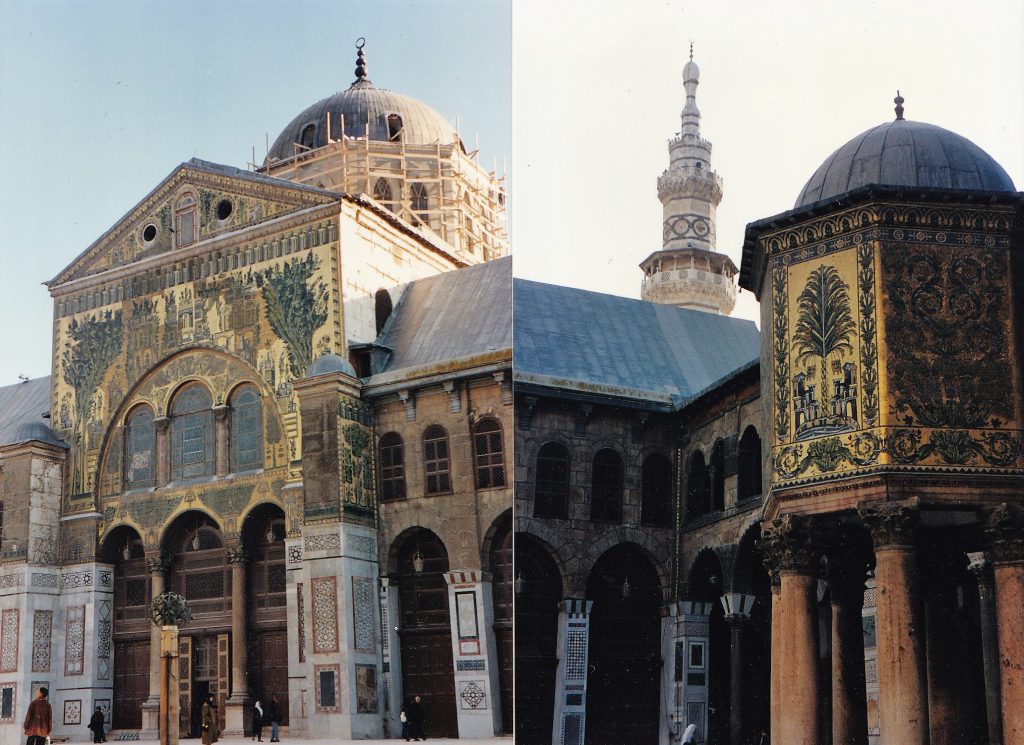Number 8/10
1994, Umayyad Mosque, or Great Mosque, of aš-Šām alias Damascus, Syria. A holy site since the Iron Age, when a temple dedicated to the thundergod Hadad-Ramman was situated here. That was followed by a basilika dedicated to St John the Baptist, in the early 8th century replaced by the Umayyad mosque. It’s a wonderful building to which I’d go quite often, to sit down inside the great hall to find shade and calm. There’d be quite some people sitting around reading a newspaper or a book. It also features the most beautiful adhan (call for prayer) that I’ve heard, on Fridays, with a rare call-and-response pattern. Indeed, on one Friday, while some of my hostel mates were on their way to meet with Hizb’ullah contacts (I can see fear in your eyes!) in a rather, hmmm, “determined” mosque, I went to this one and was able, eventually, to convince the guard to let me in as a visitor during prayer time. That’s a no no, usually, but I engaged him in a pseudo-theological argument the bottom line of which was: wouldn’t it be more harmful to turn away a potential Muslim than to keep a kafir (a non-believer) out? Once inside, I found a place at the back, though obviously not amongst the women there, and simply watched. Given my Arabic was even poorer than it is now, that’s all I could do. In a later part of the sermon, the preacher’s voice sounded angry, and the word “America” sounded rather often. Well, what would I expect!? What caught my attention most though was the liberty of the small children in there, whom you’d find running around, from parent to parent, almost chasing each other, while the adults were busy about their prayer routines. That was unexpected. By the way, those hostel mates, of British and Canadian origin if my memory serves me right, returned completely exhausted from a six-hour long sermon session in a crammed mosque where the mufti of Syria was leading the prayer. Still, they had plans for further meetings with the Hizb’ullah in Lebanon. Were they on their way to become trouble makers? I don’t know. This was still in 1994, not 2012.

Three more memorable stories from Dimashq: One involves the Central Police Headquarters where I had to extend my visa beyond the initial 14-day permit. Kafka would have loved both the building and the procedures. I do not remember all the steps it took, the floors I walked, the offices I entered when I went there to drop an application form, usually signed off with the officer not even looking up at me, with some ID pictures (girls allegedly needed one more than us guys), a stamp (bought outside the building), and eventually my passport. Yes, you’d walk away without your passport, and were asked to pick it up the next day. No, that didn’t feel comfortable.
The second one involves a word, “manyak”. Days earlier, in Lattaqiya, I had, questioningly, referred to a young guy at the hotel whom everyone was laughing at as “manyak”. Be it through Ottoman connections, or through the French “protectorate” period, there’s quite some French influence in Syrian Arabic (as in Turkish). So I thought that word could be used, and would mean roughly the same as in Turkish, a crazy person. It became obvious it didn’t. The laughter in the faces of the teenagers around me froze, gave way to what lokked like panic, and then they dispersed in a new kind of laughter, into which the shock had been mixed as a new ingredient. I felt sorry, but for what exactly I still didn’t know and it would take me weeks to find out. Here in Damascus a local guy was hanging out with us in the hostel, and I tried to ask him several times what “manyak” meant. He started explaining, stopped, started again – and so on, over two days. Eventually he spat it out: it designates a male prositute. I couldn’t have used a worse term for that young lad. Apologies, wherever you are now!
The last one is from a hamam. I had found myself a non-touristy one, and had to put up with the consequences. While all the procedures are centred on decency, I found a kind of male intimacy that Western European, let alone German culture hadn’t prepared me for. After washing, being washed and being massaged by one or the other man in there, an older man approached me to have a chat. Wonderful, sure. But his questions became ever more detailed and specific, and you may appreciate my discomfort sitting there with nothing but a wet towel around my waist, and he started discussing circumcision with quite an amount of detail. Anyways, I learnt about male physical closeness on these journeys in the Middle East, and this was a memorable moment in that process.
